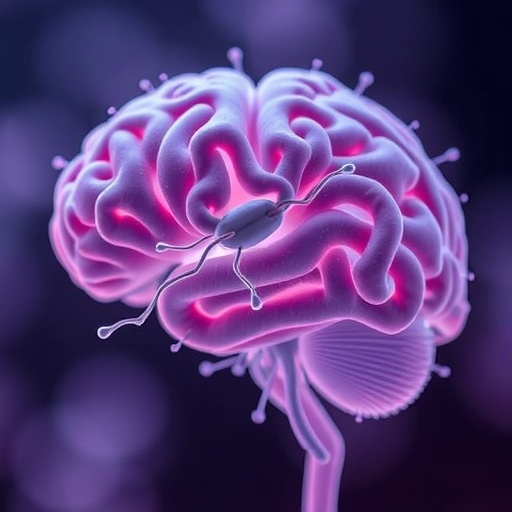Summary
In recent groundbreaking research conducted at Michigan State University (MSU), scientists have unveiled compelling evidence that microorganisms, or microbes, play a fundamental role in the early development of the brain. This study focuses particularly on the hypothalamic paraventricular nucleus (PVN), a vital brain region responsible for regulating stress responses, social behaviors, and critical physiological functions such as blood pressure and water balance. The implications of these findings challenge long-held assumptions about neonatal brain development and emphasize the profound influence of the microbiota from the earliest stages of life, even prenatally.
The research, recently published in the journal Hormones and Behavior, employed sophisticated mouse models to explore how natural microbial exposure shapes brain architecture immediately after birth and potentially during fetal development. Due to the ethical and practical limitations of studying this phenomenon directly in humans, mice provide a well-established model owing to their significant physiological and behavioral parallels with humans. These models allowed the team to dissect the nuances of microbial influence in a controlled setting, shedding light on the biological pathways through which microorganisms affect neural development.
One of the key innovative methods used in this study was the cross-fostering approach. Researchers transferred newborn mice raised in germ-free environments — thus devoid of any microbiota — to mothers whose microbiota had not been disrupted. By comparing these mice to naturally colonized control groups, the researchers were able to parse out the relative effects of prenatal versus postnatal microbial exposure on the development of the PVN. Their findings revealed tha
Source:

AI News Q&A (Free Content)
Q1: What role do microbes play in early brain development, according to the recent study at Michigan State University?
A1: The study at Michigan State University found that microbes play a significant role in shaping early brain development. Specifically, they influence the hypothalamic paraventricular nucleus (PVN), a brain region crucial for regulating stress responses, social behaviors, and physiological functions such as blood pressure and water balance. The study highlights that microbial effects may start in the womb, indicating that maternal microbes have a signaling role during fetal development.
Q2: What innovative method was employed in the MSU study to explore microbial influence on brain development?
A2: The MSU study used a cross-fostering approach where newborn mice raised in germ-free environments were transferred to mothers with intact microbiota. By comparing these mice with naturally colonized controls, researchers could differentiate the effects of prenatal versus postnatal microbial exposure on the development of the PVN, revealing that microbial influence begins before birth.
Q3: How does the gut-brain axis connect the gastrointestinal tract and the central nervous system?
A3: The gut-brain axis involves a two-way biochemical signaling between the gastrointestinal tract and the central nervous system. It includes neuroendocrine, neuroimmune systems, and the hypothalamic-pituitary-adrenal axis. Gut microbiota plays a crucial role, influencing brain development by regulating brain chemistry and neuro-endocrine systems associated with stress, anxiety, and memory function. Chemicals like cytokines, neurotransmitters, and microbial metabolites are transported to the brain, impacting various brain functions.
Q4: What insights do recent studies offer about the gut-immune-brain axis in health and disease?
A4: Recent studies have highlighted the gut-immune-brain axis as a dynamic communication system involving gut microbiota, immune responses, and the central nervous system. Disruptions in gut microbiota composition have been linked to neurological disorders like autism, Alzheimer's, and depression. The research underscores potential therapeutic opportunities in targeting these interactions, offering possibilities for personalized microbiome interventions and biomarkers.
Q5: What have studies using Bayesian Network Regression models revealed about microbial influence on biological phenotypes?
A5: Bayesian Network Regression models have been used to identify microbial drivers in biological phenotypes by considering microbial networks as predictors. These models can pinpoint influential nodes and edges in microbial networks that drive phenotypic changes. However, the study notes scenarios where the method may perform poorly, offering practical advice for microbiome researchers to apply these models effectively.
Q6: How does the gut microbiome contribute to the regulation of the gut-brain axis, particularly in diseases like IBS?
A6: The gut microbiome contributes to the gut-brain axis by releasing chemicals that influence brain development and function. In diseases like Irritable Bowel Syndrome (IBS), it's confirmed that the gut microbiome has a direct influence, while other conditions like anxiety and depression are linked through the gut-brain axis. Probiotics can restore microbial balance, suggesting a role in treating and preventing anxiety and depression.
Q7: What are the implications of microbial influence on neonatal brain development for future research and therapies?
A7: The implications are significant as this research challenges previous assumptions about brain development. Understanding microbial influence opens pathways for developing therapies targeting microbial populations to support brain health from the earliest stages of life. It also suggests that maintaining a healthy microbiota could be crucial for preventing neurological and psychiatric disorders, encouraging further research into microbiome-based interventions.
References:
- Identifying microbial drivers in biological phenotypes with a Bayesian Network Regression model
- Multivariate Log-Contrast Regression with Sub-Compositional Predictors: Testing the Association Between Preterm Infants' Gut Microbiome and Neurobehavioral Outcomes
- Gut–brain axis
- Maternal microbes play a significant role in shaping early brain development, study suggests
- Microbes found to play a key role in shaping early brain development
- MSU Science Festival




